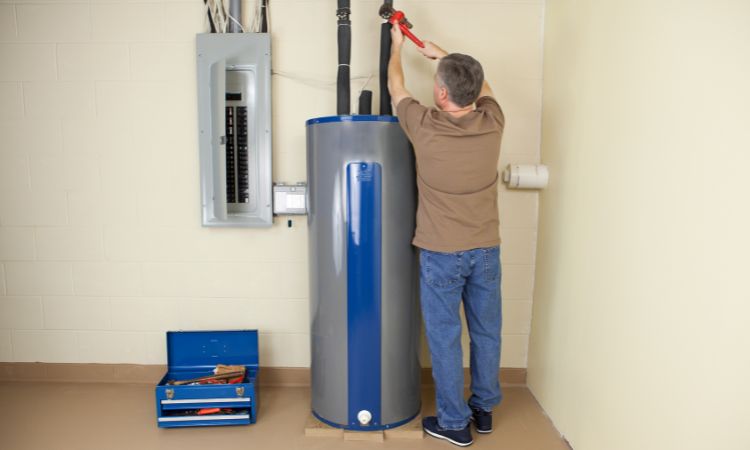Typical Heater Issues Explained
Typical Heater Issues Explained
Blog Article
What are your opinions on Common Problems with Your Home Water Heater?

Picture starting your day without your routine warm shower. That already establishes an inadequate tone for the rest of your day.
Every home requires a reliable water heater, yet just a few understand exactly how to handle one. One simple method to maintain your hot water heater in leading shape is to check for faults regularly as well as fix them as soon as they appear.
Remember to switch off your water heater before sniffing about for faults. These are the hot water heater faults you are most likely to come across.
Water too hot or too cold
Every hot water heater has a thermostat that determines how warm the water obtains. If the water entering into your house is also hot regardless of establishing a practical optimum temperature level, your thermostat could be faulty.
On the other hand, as well cold water might be because of a failed thermostat, a broken circuit, or inappropriate gas flow. As an example, if you make use of a gas water heater with a damaged pilot light, you would obtain cold water, even if the thermostat is in excellent condition. For electrical heating systems, a blown fuse might be the culprit.
Not nearly enough warm water
Water heaters can be found in numerous sizes, relying on your hot water needs. If you lack hot water prior to everyone has actually had a bath, your water heater is also little for your family size. You should consider mounting a larger water heater storage tank or choosing a tankless water heater, which uses up less space and also is much more resilient.
Strange noises
There go to least five sort of noises you can hear from a water heater, however one of the most typical analysis is that it's time for the hot water heater to retire.
First of all, you must know with the typical seems a hot water heater makes. An electrical heating system might seem different from a gas-powered one.
Popping or banging audios typically suggest there is a piece of debris in your containers, and also it's time to cleanse it out. On the other hand, whistling or hissing sounds might simply be your shutoffs letting some stress off.
Water leaks
Leakages could originate from pipes, water connections, valves, or in the worst-case circumstance, the tank itself. Over time, water will rust the tank, and also find its way out. If this occurs, you need to replace your water heater as soon as possible.
However, before your change your entire tank, make sure that all pipelines remain in area and that each valve functions completely. If you still need help determining a leak, call your plumber.
Rust-colored water
Rust-colored water suggests among your water heater components is corroded. It could be the anode pole, or the tank itself. Your plumber will have the ability to determine which it is.
Warm water
Despite how high you established the thermostat, you will not get any type of warm water out of a heating system well past its prime. A water heater's efficiency may minimize with time.
You will certainly also obtain lukewarm water if your pipelines have a cross link. This means that when you switch on a faucet, warm water from the heating system flows in together with regular, cold water. A cross connection is easy to area. If your warm water taps still pursue shutting the hot water heater valves, you have a cross link.
Discoloured Water
Corrosion is a major reason for unclean or discoloured water. Corrosion within the water tank or a falling short anode pole can cause this discolouration. The anode rod protects the tank from rusting on the within as well as ought to be inspected annual. Without a rod or a properly operating anode pole, the hot water swiftly corrodes inside the tank. Call a professional water heater technician to identify if replacing the anode pole will repair the problem; if not, replace your hot water heater.
Verdict
Ideally, your hot water heater can last ten years before you require a change. Nonetheless, after the 10-year mark, you may experience any of these faults a lot more frequently. Now, you ought to add a new hot water heater to your spending plan.
How To Troubleshoot 3 Common Water Heater Problems in Twin Cities
The Water Heater Is Leaking
A leaky cold water inlet valve A loose pipe fitting A leaky temperature and pressure relief valve A corroded anode rod A cracked tank Turn Off Your Water Heater:
Shut off your gas water heater by turning the gas valve on the unit to the “OFF” position. Shut off your electric water by switching its power off at your electrical panel. Look for a two-pole breaker labeled “water heater” and turn it to the “OFF” position. Move the ball valve connected to the water heater to be perpendicular to the piping at a 90° angle. Look for the Leak:
Depending on whether the water is coming from the tank's top or bottom, you’ll want to look for the leak in different locations.
If the leak comes from the top of the tank, carefully look for water escaping from the cold water inlet valve or loose pipe fittings. Rusted hot and cold water valves can have loose connections with the tank, with water leaking out of them.
https://mspplumbingheatingair.com/blog/how-to-troubleshoot-3-common-water-heater-problems
I stumbled upon that article on Common Problems with Tank Water Heaters when surfing around the web. Sharing is good. You never know, you might be helping someone out. Thanks a lot for your time. Come back soon.
Issue? Dial fast! Report this page